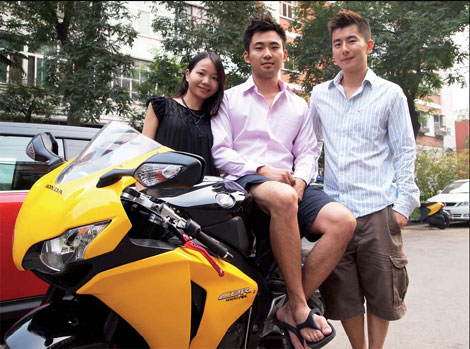Three heads, two wheels fill meals gap
Updated: 2011-09-16 08:55
By Liu XiaoZhuo (China Daily)
|
|||||||||
|
|
A trio of friends has Banded together to deliver meals to hungry beijingers
Michael Lewis, John Klee and Sophia Wang liken themselves to the three good friends in the book series Harry Potter. They talk and joke happily with each other when hanging out together, and use each other's strengths to accomplish tasks. Their friendship is the foundation of their business in Beijing.
In May, the trio founded Jinshisong, which they describe in English as best food delivery. The company, based in the prosperous Sanlitun area of Beijing, started with three employees and it now employs about 20 Chinese and foreigners, all under the age of 30. Lewis says the company's revenue grew dramatically by 250 percent for two consecutive months in July and August after it started the business in mid-May, but will not reveal figures.
Lewis, 26, though born in China, grew up in Pennsylvania. He didn't return to China until 2009, when he decided to study Chinese at Peking University in Beijing.
"Though I am apparently Chinese from my appearance, my friends back in America tell me that I am even more American than Americans," Lewis jokes.
It was at Peking University that Lewis formed a bond with Wang, a 28-year-old Chinese woman from Hubei province.
Lewis met Klee while working at the financial giant JP Morgan in New York after Lewis graduated from Ohio State University. Klee, 25, from Tennessee, has various hobbies, such as playing the guitar and riding motorcycles. Klee came to China three years ago because he had an urge to explore the world.
Wang says that their different personalities work together to form a functional business.
"We call Michael the social butterfly because he is busy socializing with all kinds of people. His ability to communicate with all kinds of people is really helpful to broaden our business. John is an energetic person who has an ability to make things happen. His efficiency gives us inspiration and motivation to work," Wang says.
Lewis describes Wang as the oil that keeps the company chugging along.
"Most of the members on our team are boys. And Wang, a considerate girl who is competent to manage our company, helps the whole business move forward smoothly," he says.
The three of them would often hang out, and as time passed by, they realized the food delivery service in Beijing was lacking in quality.
"Many times after finishing work late at night, I couldn't find a place to have a big dinner," Lewis complains. Wang says that many Chinese people at her age have the same problem.
"The service of the Chinese food delivery industry is far from perfect, so why not to do it better ourselves?" Klee says.
Jinshisong delivers food by motorcycles that are equipped with specially designed insulated boxes that maintain the temperature of the food. But what sets the company apart from others is its effort to involve technology at every point of the food delivery process.
"Most of our work is done through the Internet, including providing the information of food available and receiving orders online. The majority of our customers order food through the Internet," Wang says.
The drivers use smart phones with proprietary software that allows the office to monitor the whole process of the delivery. Using the phones' GPS function, drivers find their destination. Klee says that in the near future, customers will be able to track the status of their order through the Internet.
To help grow its customer base, Jinshisong is releasing an iPhone and Android app they developed themselves, which will be available to download in the coming months.
"This app will allow our customers to communicate with us at any time and at any place. They can also pay conveniently through it," Klee says.
They also make full use of a micro blog to promote their services. They now have more than 32,000 followers.
"In addition to introducing the service, we also spread food culture. One of our followers said Jinshisong makes him realize that food is much more than just eating, but a kind of enjoyment of life," Wang says.
Jinshisong has formed working relationships with 32 restaurants, including high-end Chinese and Western restaurants. Klee, holding an iPad2, says they prepared for more than a year before starting Jinshisong, designing the website, visiting restaurants and recruiting employees.
"It was hard at the beginning. I visited local restaurants and was refused by many, as most of them thought that people should enjoy food in the restaurant, not just getting the food from a delivery company," Klee says.
They don't think their service conflicts with that of restaurants, rather they see their service as a supplement.
"It's OK that people want to spend their spare time relaxing in restaurants and coffee shops. But for those who do not have enough time, our service pulls those restaurants closer to them."
Wang says their target customers are people with mid- to high-end incomes who have little time to go to restaurants for a feast.
"Ordering from our website and getting the food delivered by us is a good option. They do not have to endure traffic and the big crowds in the restaurants," Wang says.
Shen Yang, in the financial industry, orders from Jinshisong three or four times a week. She says that the speed of the delivery is quick.
"Their service makes my life easier," she says.
Being from America, Lewis and Klee understand the needs of expatriates living and working in China. Unlike some other delivery services, Jinshisong supplies knives and forks to its customers. Also, their website, Jinshisong.com, is in both Chinese and English versions. And all of their employees, from the phone operators to the drivers, speak English.
The delivery service is now only available from 10:30 am to 9:30 pm in Beijing's Chaoyang, Dongcheng and Xicheng districts, but there are plans to expand as their business grows. Jinshisong typically charges 15 yuan ($2) for the first 3 km, and only delivers if the order is at least 68 yuan.
For the trio, Jinshisong is not just a company, but also an indispensable part of their lives.
"This food delivery company is similar to a marriage between all of us. There are conflicts and also successes, but what is most important is that we get happiness from it," Wang says.











